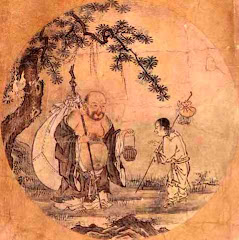
WHY DID this idea arise in people's minds? that meditation brings happiness. In fact, wherever they found a happy person they always found a meditative mind -- both things got associated. Whenever they found the beautiful meditative milieu surrounding a man, they always found he was tremendously happy -- vibrant with bliss, radiant. They became associated. They thought: Happiness comes when you are meditative. It was just the other way round: meditation comes when you are happy.
But to be happy is difficult and to learn meditation is easy. To be happy means a drastic change in your way of life, an abrupt change -- because there is no time to lose. A sudden change -- a sudden clash of thunder -- a discontinuity.
A discontinuity with the past. A sudden clash of thunder, and you die to the old and you start afresh, from ABC. You are born again. You again start your life as you would have done if there had been no enforced pattern by your parents, by your society, by the state; as you would have done, must have done, if there had been nobody to distract you. But you were distracted.
You have to drop all those patterns that have been forced on you, and you have to find your own inner flame.
Don't be too much concerned about money, because that is the greatest distraction against happiness. And the irony of ironies is that people think they will be happy when they have money. Money has nothing to do with happiness. If you are happy and you have money, you can use it for happiness. If you are unhappy and you have money, you will use that money for more unhappiness. Because money is simply a neutral force.
I am not against money, remember. Don't misinterpret me: I am not against money -- I am not against anything. Money is a means. If you are happy and you have money, you will become more happy. If you are unhappy and you have money, you will become more unhappy because what will you do with your money? Your money will enhance your pattern, whatsoever it is. If you are miserable and you have power, what will you do with your power? You will poison yourself more with your power, you will become more miserable.
But people go on looking for money as if money is going to bring happiness. People go on looking for respectability as if respectability is going to give you happiness. People are ready, at any moment, to change their pattern, to change their ways, if more money is available somewhere else.
Once the money is there, then suddenly you are no more yourself; you are ready to change.
This is the way of the worldly man. I don't call those people worldly who have money -- I call those people worldly who change their motives for money. I don't call those people unworldly who have no money -- they may be simply poor. I call those people unworldly who don't change their motives for money. Just being poor is not equivalent to being spiritual; and just being rich is not equivalent to being a materialist. The materialistic pattern of life is that where money predominates over everything. The non-materialistic life is that where money is just a means -- happiness predominates, joy predominates; your own individuality predominates. You know who you are and where you are going, and you are not distracted. Then suddenly you will see your life has a meditative quality to it.
But somewhere on the way. everybody has missed. You were brought up by people who have not arrived. You were brought up by people who were unhealthy themselves. Feel sorry for them! I am not saying be against them; I am not condemning them -- remember. Just feel compassion for them. The parents, the school-teachers. the university professors, the so-called leaders of the society -- they were unhappy people. They have created an unhappy pattern in you.
And: you have not yet taken charge of your life. They were living under a misinterpretation -- that was their misery. And you are also living under a misinterpretation.
MEDITATION comes naturally to a happy person. Meditation comes automatically to a joyous person. Meditation is very simple to a person who can celebrate, who can delight in life. People are trying it from the other way -- which is not possible.






